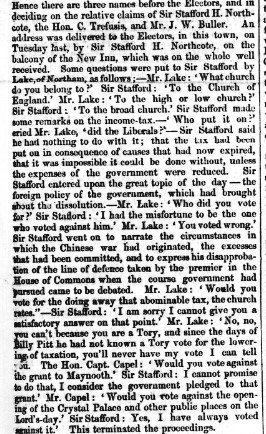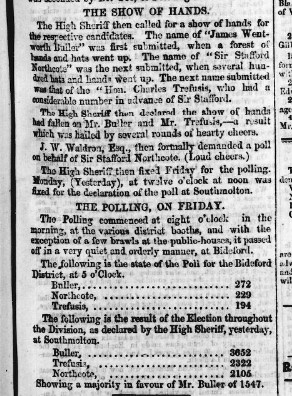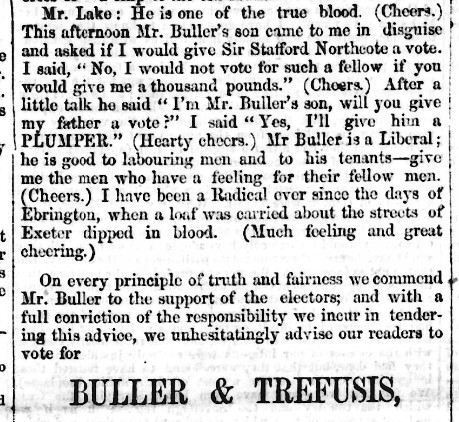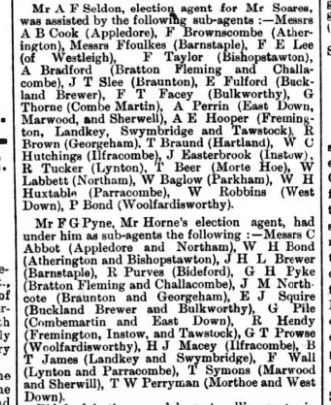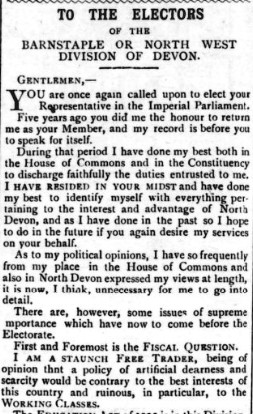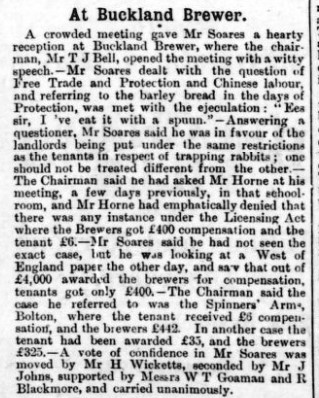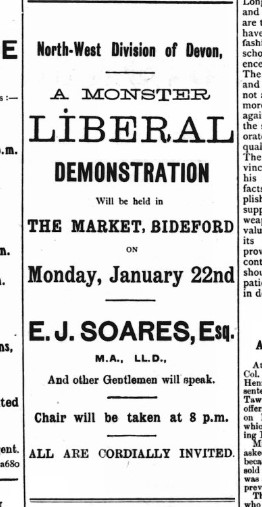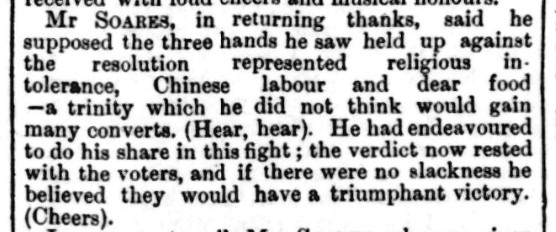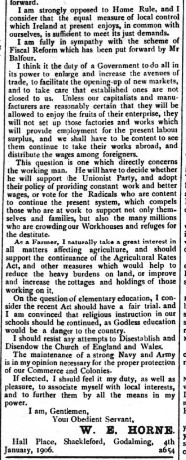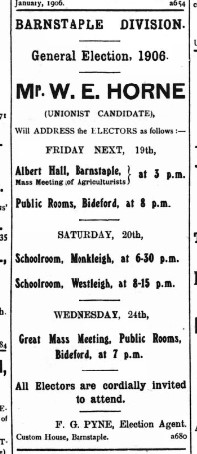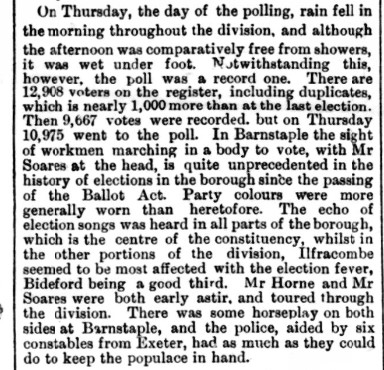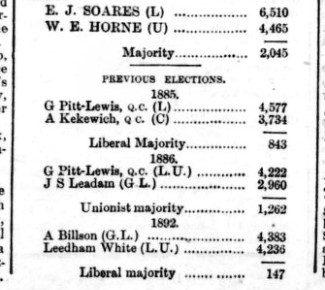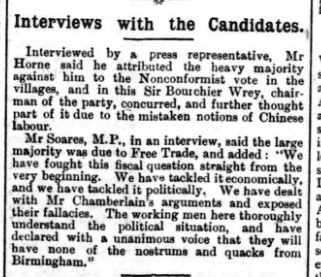Parliament and the Parish of Buckland Brewer (by Jim Lowe)
When I started researching this project, I thought I would find it interesting and, with a head start in having a Politics Degree from Bristol University, pretty straight forward in terms of number crunching and tabulating historical events. How wrong I was!
Buckland Brewer has found itself in a number of constituencies over the past 200 years. Prior to the 1832 reform act it was in the county constituency of Devon which returned two MPs. Following the act, Devon was split into two constituencies excluding the boroughs and Buckland found itself in the new Northern Division. The 1867 Reform Act Rural Devon was split into three Parliamentary seats - East, West and North. The 1885 redistribution of seats act split Devon into smaller constituencies it thereafter was called the Barnstaple and Northwest Devon Constituency and this time returning only one member of parliament. Up until the 1950 election the Parish of Buckland Brewer lay within the Barnstaple and North West Devon Constituency; from 1950 to the first election in 1974 in the Torrington Constituency; then until 1983 it was part of the North Devon Constituency; and since 1983 has been in the Torridge and West Devon Constituency. As many of you know, boundary changes take place as part at the behest of the government through a review by the Boundary commission although they decision a few years ago with a proposal to create a Coastal constituency embracing the north coast of Devon and Cornwall which attracted a lot of opposition especially from the Cornish and was quietly dropped. The latest proposals create a new seat called Torridge and Tavistock.
My research led me up all sorts of various avenues especially when it came to look at various MP’s who have represented the Parish of Buckland Brewer in Parliament and in many ways it’s the Members of Parliament that are the most interesting aspects of this project. There have been many in the main since 1832 Liberal or Conservative, although from 1941-45 the MP was a member of the Commonwealth Party (more about this later). As a taster - one crossed the floor of the house, one had the whip withdrawn and became an independent MP, one not only left his Party but founded another one, and another was charged with conspiracy to murder. At one election, both the Liberal and Conservative candidates supported the same prime minister, and one stood three times twice unsuccessfully in two different constituencies. Even losing candidates go on to high office - David Owen had his first political outing in in the 1964 General Election. On top of that we had the famous 1958 Torrington by-election which saw the government candidate defeated.
Just a short word about our Parliamentary Parties
Prior to the 18th century the Tories and the Whigs were not so much Political parties as we know them today but more ad hoc groups of MPs who represented various interest. The Whigs greatest act as the glorious revolution of 1688 followed by the act of settlement with the monarch becoming head of state and not thereafter having a limited political role. Whereas the Tories were somewhat ambivalent to this development. In 1834 the Tory transformed itself into the Conservative Party around the publication of Robert Peels famous Tamworth Manifesto. The Whigs fragmented into the Liberal Party in 1859 and changed again in 1988 forming the Liberal Democrats.
The last half of the 19th Century dominated by Irish Independence .and the corn laws, electoral change which caused further splits in two parties with a third grouping being formed as Liberal Unionist who eventually merged with the conservatives to form the Conservative and Unionist Party in 1912. The Labour Party as we know it today was founded in 1901 mainly from the TUC Parliamentary Committee, the Independent Labour Party and the Fabian Society who HG. Wells was a leading light at the time. At first called the Labour representation committee it changed its name to the Labour Party following the General election of 1906.
Before we look in detail at the various Members of Parliament let us quickly look at the various acts of Parliament that has seen the fulfilment of universal suffrage as we see it today.
The Reform Act 1832
There have been many Parliamentary acts since 1832 but the act of that year, though referred today as the great Reform Act, it really wasn’t but it did kick the process of change of and spawned many further acts of Parliament. So, change in the franchise was slow but by 1969 we were almost there but many think we can still go further in enabling in simple terms every vote to count. One further general comment about politics in North Devon - throughout the many centuries we have had a parliament, Devon Land owning families have dominated parliamentary representation - including the Chichester, the Acland’s, the Rolle’s the Clinton’s and the Fortesque’s.
The Second Reform Act 1867
Before the 1867 Act only a million of the seven million men in England and Wales could vote. The Act doubled that number and by the end of 1868 all house holders and lodgers in boroughs who paid rent of £10 a year or more were eligible to vote. It also lowered the property threshold which enabled agricultural landowners and tenants with very small amounts of land to vote. The Act did little to balance out or redistribute seats. Though the number of two member seats was reduced to one, a very small number of new single member seats were created and in Birmingham, Leeds, Liverpool and Manchester, representation was increased from two to three MPs. The changes were influenced by the campaign led by the chartist movement driven by the working classes which demanded universal suffrage. The Act also created nine new single member constituencies and also abolished further Borough seats.
In Devon the Totnes, Dartmouth and Honiton Constituencies were disenfranchised and Tavistock reduced to one Member of Parliament. As a result, rural Devon which previously was split into two constituencies was now split into three - Devonshire East, West and North returning two members each. Buckland Brewer remained in the North.
The Third Reform Act 1884
By the 1980’s it was widely recognised that voters in counties deserved the same political rights as those in the boroughs. Parliaments, or should I say the Tory Party’s resistance to one man one vote, was partially overturned in 1884 and the Act extended the 1867 concessions from the boroughs to the countryside. All men paying an annual rent of £10 and all those holding land valued at £10 now had the vote. This significantly increased the electorate from 3 million to nearly 6 million registered voters. Yet 40% of men and all women were still disenfranchised. Due to opposition by Conservatives in the Lords and a constitutional crisis, Queen Victoria intervened and arranged for Lord Salisbury (Tory Leader) and Gladstone (Liberal Leader) to meet - the outcome being the Arlington Street Compact made at Salisbury’s house. This led to the creation of three Boundary Commissions, England and Wales, Scotland and Ireland with the instruction to create constituencies so far as practicable., and ultimately, the Redistribution of Seats Act of 1885.
Most areas would now only return one member of Parliament although 23 seats, including the City of London, Bath continued to return two members until 1910. The reduction of two member constituencies hastened the decline of the aristocracy in Parliament and the shady deals between parties to elect one member each form each constituency therefore returned to Parliament uncontested. Contested elections became norm after the act. 657 of the 670 seats were contested at the 1885 General election. In Devon, eight new single seat constituencies were created:
Ashburton The Mid Devon Division
Barnstaple North West Division
Honiton The Eastern Division
South Molton The Northen Division
Tavistock The West Division
Tiverton The North Eastern Division
Torquay and Totnes The Southern Division
Exeter was reduced to one MP
Plymouth and Devonport still had two each
By the 1918 election Plymouth including Devonport were reduced to three distinctive constituencies. Buckland Brewer stayed in the Barnstaple and North West Constituency until the election of 1950.
Representation of the Peoples Act 1918 - known sometimes as the fourth reform act.
It was the first general election to take place on a single day. The counting was delayed for 28 days so servicemen overseas could vote and it was the first election in which women over the age of thirty could vote, provided they were householders, occupiers of property with an annual rent of £5 and graduates of British universities. The same year an act was also passed allowing women to be elected into the House of Commons. All men over the age of 21 could vote and as a result of the Act the male electorate was extended by 5.2 million to 12.9 million. The female electorate was 8.5 million. Interestingly an amendment to bring in proportional representation was only lost by seven votes.
The Representation of the Peoples (Equal Franchise) Act of 1928 - Women at last gained equal voting rights. The act gave votes to all women over 21. This added another five million to the electorate.
Representation of the Peoples Act 1948 - This act brought in more governance to elections regarding was could and could not be done during elections aimed mostly at the role of returning officers. The twelve University constituencies were abolished therefore denying graduates two votes at an election and the last (university) two member seats were abolished.
In 1969 an act was passed to reduce the age of voting from 21 to 18
I want to mention some of the Members of Parliament who have represented the various constituencies that have included Buckland Brewer and some of the interesting contest over the last 100 years up until the 1997 General Election:
1911 By- Election - Won by Godfrey Baring for the Liberals. The Election was caused by the resignation of Ernest Soares, due to his ill health, and Baring was part of the Baring Banking dynasty, and came from the Isle of Wight following losing his seat there in the 1910 General Election. As Chairman of the Isle of Wight County Council since 1898, it was a position he held for the rest of his life.
1918 General Election - Godfrey Bearing decided to go back and stand in the Isle of Wight but lost. Tudor Rees a Welsh lawyer held the seat for the Liberals. This election was milestone in terms of women (not all) getting the vote. This election was also known as the coupon election. In this constituency electors were faced by two candidates who supported the same Prime Minister and government. Lloyd George the Prime Minister issued coupons to the candidates that he wanted re-elected to support the coalition Government. It was unclear if Tudor Rees got one but once elected, he took the government whip.
1922 General Election - Basil Peto (Unionist), a businessman, defeated Tudor Rees at this election. Peto had been the MP for Devizes from 1910 to 1918.
1923 General Election - Tudor Rees won the seat back again with a 2.5 % swing. This election was notable because it was a three-horse race which included the Labour Party for the first time.
1924 General Election - Basil Peto won the seat back but fell out with Stanley Baldwin’s Conservative Government and lost the party whip in April 1928. Following a unanimous vote of confidence in him by the local party executive he was readmitted to the Parliamentary party in November that year. In January 1927 he was created a Baronet, of Barnstaple.
1929 General Election - Basil Peto retained the seat in what was known as the ‘Flappers’ - all women over 21 could now vote.
1931 General Election - Basil Peto again retained the seat against the Liberal candidate, Richard Acland (who had fought for Torquay in the 1929 General Election), part of the Acland dynasty that owned vast tracks of land in Devon and Somerset and whose seat of power was Killington Court, near Tiverton. Acland, a barrister, was the eldest son of Richard Thomas Dyke Ackland, a Liberal MP, and his wife Eleanor Acland nee Cropper who was a Liberal Politician, Suffragist and novelist.
1935 General Election - Basil Peto stood down and was succeeded as the Conservative candidate by Benjamin Lampard-Vachell who in turn was defeated by 454 votes by Richard Acland.
There is little doubt in my mind that Richard Acland is the most interesting of all the MP’s that have represented this parish in Parliament. He helped launch the Popular Front in December 1936 which was an attempt to form an alliance between political parties and individuals of the left and centre-left to come together to challenge the appeasement policies of the Government led by Neville Chamberlain. They even stood candidates in by-elections and won - notably Vernon Bartlett for Bridgewater Somerset in 1938. An election was due before the end of 1940. Acland was again adopted as the Liberal candidate but war intervened and the grand coalition under Churchill was formed in the Spring of 1940. In 1942, Acland broke with the Liberals to create the socialist British Common Wealth Party with J.B Priestly and Tom Wintringham, opposing the main coalition between the major parties. Now firmly on the left of British politics, Acland, an advocate of public land ownership, sold his West Country estates at Killerton and Holnicote to the National Trust - partly out of principle and to keep its preservation intact. There was also need to pay significant death duties.
The Commonwealth Party won a number of seats at by-elections but the party only won one seat at the 1945 General Election with Acland choosing not to return to Barnstaple and coming a poor third in Putney. He subsequently joined the Labour Party, fought and won the Gravesend by-election in 1947, and he continued to represent Gravesend until 1955 when he resigned over the Party’s support for the Conservatives nuclear defence policy. He stood as an independent in Gravesend at the 1955 General Election, coming third. He became a maths teacher, and in 1957 helped form CND (Campaign for Nuclear Disarmament). He was a Senior Lecturer in Education at St Lukes College, Exeter between 1959 and his retirement in 1974. He died in Exeter in 1990 aged 83.
1945 Election Barnstaple - There was no Red Wall in Barnstaple which was won comfortably by Christopher Peto, a soldier with a distinguished war record, and the son of Basil Peto, the previous Conservative MP. That said, the Lib/Lab vote was 57% of the turnout. Interestingly, the Liberal candidate was Mark Bonham Carter who came second and was Prime Minister, H H Asquith’s grandson.
For the 1950 General Election, Buckland Brewer found itself in the new Parliamentary constituency of Torrington. The new seat included the Municipal Borough, Great Torrington and Okehampton, the Urban districts of Crediton and Northam and the Rural Districts of Bideford, Crediton and Okehampton. This new seat was won by George Lambert who called himself a National Liberal. In the 1945 Election, he was elected for the South Molton constituency and succeeded his long serving father. Like the Barnstaple seat it was abolished prior to the 1950 General Election. George Lambert was returned again in the 1951 and 1955 elections. On his father’s death in 1958 he became the 2nd Viscount Lambert and entered the House of Lords thus creating a by-election.
1958 By-Election - For those that can remember, this was the first of the big television covered by-elections, fuelled no doubt by a Conservative Government that was unpopular at the time and sensationally won by Mark Bonham Carter. This was the first sign of the Liberal’s national revival which continued at other by-elections across the country over the next fifteen years. Mark Bonham Carter, who was made a life peer in 1986, was the grandson of the Liberal Prime Minister H.H. Asquith. As previously mentioned, he stood for Barnstaple in 1945 and was an uncle to Helena Bonham Carter, the actress.
1959 General Election - The seat was regained by the Conservatives at the General Election by Percy Browne, a very independent farmer who, when elected, declined any government office and enjoyed ‘whip-baiting’. His other claim to farm was he rode in the 1953 Grand National where, unfortunately, he and his horse, Knuckleduster, pulled up. There were only five finishers that year.
1964 General Election - Percy Browne stood down and was succeeded by Peter Mills who held the seat until it was abolished prior to the 1974 General Election. He went onto represent West Devon and then Torridge and West Devon until 1987. He held several junior ministerial roles and was knighted in 1982.
Mark Bonham Carter stood for the third time as the Liberal Candidate. The Labour candidate who came third was David Owen who eventually became Foreign Secretary in 1977 and later formed and led the SDP (Social Democratic Pary).
1974 General Elections (February and October) - Re-drawn seat - the new seat included the Boroughs of Barnstaple and Bideford, the Urban Districts of Ilfracombe, Lynton and Northam and Rural Districts of Barnstaple, Bideford and South Molton. Buckland Brewer inherited Jeremy Thorpe who’d held the original seat of North Devon since 1959. The son and grandson of Conservative MPs, to his opponents he was a bit of showman, light on political policy, but to his Party and his constituents he was seen as an excellent local MP, charismatic, and an excellent speaker and witty. He was elected leader of the Liberal Party in 1967 and the 1974 General Elections provided the high-water mark of his political career when the Liberal Party polled over 6 million votes but returned only 14 MPs under the first past the post system. He polled 53.9% of the vote in February 74, and 48.1% of the vote in October 74 in North Devon. His fortunes declined from late 1975 when rumours of his involvement in a murder plot began to multiply and he resigned the leadership of the party in 1976. In May 1979, he was tried at the Old Bailey on charges of conspiracy and incitement to murder and although he was acquitted of all charges, this was the end of his political career. He died on the 4th December 2014.
1979 General Election - Tony Speller, who came from Exeter, took the seat at the second attempt from Jeremy Thorpe, taking over 50% of the vote. We then saw the creation of Torridge and West Devon constituency which included the Parish of Buckland Brewer prior to the 1983 General Election.
1983 General Election - Peter Mills returned as the local MP as part of his seat, West Devon, was merged with Torridge.
1987 General Election - Peter Mills stood down and Emma Nicholson comfortably retained the seat for the Conservatives in this and the 1992 Election. To date, she is the only women to represent Buckland Brewer in Parliament. She defected (crossed the floor of the house) and joined the Liberal Democrats in December 1995, telling Robert Oakley, the BBC Political Editor; “the Conservative Party has changed so much while my principles have not changed at all. I would argue that it is not so much a case of my leaving the party, but the party leaving me.”
At the 1997 election she was succeeded by John Burnett who held the seat for the Liberal Democrats In the same year she was elevated to the House of Lords
Let’s now look at two election campaigns
The General Election of 1857 was the last Whig/Tory contest, the Liberal Party being formed in 1859. It was also one of the last elections predating the 1872 ballot act which required voting to take place in secret and that there was no restriction on election expenses. This did not change until the 1883 Corrupt and Legal Practices Act was passed restricting the amount of money a candidate could spend on an election campaign. The second election is the 1906 General election which saw the Liberals win a large majority, akin to the Labour Party in 1966, more or less seat by seat. This New Liberal government really did bring about change both in terms of the beginnings of creation of the Welfare state and curtailing the power of the House of Lords who up until this point shared equal power with the House of Commons.
North Devon Constituency 1857 (two seats) - The constituency stretched from Hartland to Hemyock including Crediton, South Molton and Tiverton excluding Barnstaple. The Whig Candidate was James Wentworth Buller who had previously been the Whig Member of Parliament for Exeter between 1830 and 1835. There were two Tory Candidates -f Charles Trefusis, the son of the 19th Baron Clinton, and who became the 20th Baron Clinton when his father died in 1866 and took his seat in the House of Lords. The second Tory Candidate was Sir Stafford Northcott who had fallen out with his patron in Dudley where he was the MP 1855-1857. Though he was the losing candidate in this election, he was subsequently elected for Stamford, returned to North Devon and was returned unopposed in the by-election in 1866 following the elevation of Charles Trefusis to the House of Lords. His political career then took off - President of the Board of Trade, Secretary of State for India, Chancellor of the Exchequer 1874-1870 and Leader of the Conservatives in the Commons when Disraeli was elevated to the House of Lords in 1876.
In the Bideford Weekly Gazette dated 24 March 1857, there is a report of Sir Stafford Northcote's visit Bideford:
Formal Nomination took place on Tuesday 31st March at South Molton’s Market House in front of an estimated 5,000 people in the presence of the High Sherriff - Buller was nominated by John Sillifant and was seconded by the Hon. John Fortesque; John Waldron proposed Sir Stafford Northcote and was seconded by Robert Chichester; John Curzon Moore Stevens proposed the Hon John Trefusis and was seconded by Dr Yeo of Fremington.
There is little doubt in my mind that this was a ‘plumper seat’ so called when two candidates of opposing parties came to a gentleman’s agreement to freeze out the third candidate. Evidence of this is found in the Bideford Weekly Gazette published on Tuesday 31st March where Mr Buller’s son at a meeting in Bideford the previous Wednesday urged supporters to give his father a Plumper vote. In the same edition Mr Buller and Mr Trefusis jointly urged their supporters to turn out and vote for them on polling day.
Polling took place on Friday 3rd April and according to the Bideford Weekly Gazette published on Tuesday 7th April, polling commenced at 8 o’clock in the morning at the various district booths and with the exception of a few brawls at the public houses it passed off in a very quiet and orderly manner in Bideford. The following is the state of the poll in Bideford at 5 o’clock.
Buller ................................................................272
Northcote...........................................................229
Trefusis..............................................................194
The following is the result of the election throughout the Division, as declared by the High Sheriff yesterday at South Molton.
Electionering rejoicings in Bideford - "Considerable excitement was occasioned on Saturday last by the arrival of the final sate of the poll throughout the Division. The bells of St Mary’s rung out with merry peals: a party of juveniles perambulated the town during the greatest part of the day with hand-bells which they rang with considerable spirit singing as an accompaniament ‘ Buller’s at the head of the poll my boys; the shipwrights kept their bells agoing, the greater part of the afternoon; the fife and drum added to the general rejoicing besides other noisy manifestations of joy which were kept up until late in the evening."
Barnstaple and North West Devon Constituency 1906 (One Seat) - The 1906 General Election was won by the Liberals with an historic landslide victory winning over 400 seats and produced the most radical government ever seen in the UK. This parliament introduced Old Age Pensions; The Trade Boards Act of 1909 applied minimum wages to the ‘sweated trades; the redistributive ‘1909 Peoples Budget’; the introduction of Labour Exchanges; The National Insurance act of 1911; and the Act which removed the House of Lords veto on Legislation from the Commons. Barnstaple and North West Devon was considered a safe Liberal Seat.
The incumbent Liberal MP was Ernest Soares and was standing again, first elected for the seat in 1900, defeating the then Liberal Unionist candidate Cameron Gull. Soares came from an Indian background, his family roots being Goa in Portugues India, and a solicitor by profession he lived in Upcott House in Pilton, Barnstaple. He was to serve in the Liberal Administration of H. H. Asquith from 1910 to 1911. Failing health forced him to resign this post and his seat due to ill health. He was knighted the same year and was succeeded by another Liberal Godfrey Bearing in the 1911 By-election. Edgar Horne his conservative opponent was a company director and lived in Godalming in Surrey. After defeat in 1906, he went on to be elected as the MP for Guildford in the 1910 General Election, and in later life he was best known as Chairman of the Prudential Assurance Society.
Mr. A. F. Seldon was Soares’ Agent and Mr. E. Fulford was one of the 24 Sub Agents who was responsible for Buckland Brewer. Mr. F.G. Pyne was Horne’s election agent. His sub agent for Buckland Brewer and Bulkworthy was Mr. E.J. Squires.
In the January 16th Edition of the Weekly Gazette both candidates published their 500-word Election Address. The first thing one notices is that the address is directed at ‘Gentlemen’ - Soares continues..
Soares declares himself a staunch free trader because it benefits the working classes. And opposes the Education act of 1902 calling it a flagrant violation of the elementary principles of Representative government and Religious equality; and he is strongly opposed to the system of Chinese Indentured Labour in South Africa. He wants some amendment to the Licensing Laws but is opposed to the current system of tied houses “under which the License holder is bound hand and foot”. He writes that he is ‘fully aware of the HEAVY BURDEN OF RATES in both Urban and Rural Districts, a burden which has become more oppressive since the passing of the Education Act.” And finally, states that Home Rule for Ireland is not an issue for this election, he would not support it and was more in favour of extending the principle of Local Government to Ireland. He concludes “I assure you that if you again honour me with your suffrages, I shall do my utmost to deserve your confidence. I remain, Gentleman, your obedient servant, Ernest J. Soares.”
The same edition publishes an account of a ‘crowded meeting’ at Buckland Brewer.
A Monster Liberal Demonstration to be held on Monday January 22nd was advertised and, indeed, by today’s standards, it was a Monster Demonstration!
According to the Weekly Gazette published on the 23rd January “probably upwards of 3,000 persons present. The speeches were interspersed with election songs, led by a full brass band, and the utmost enthusiasm prevailed.” The newspaper report implies that Soares was supported by Mr W T Goaman, Alderman J W Narraway, Alderman Dymond, Mr T Pollard, Mr Joshua Heywood, Mr J Metherell, and Mr Corrie Grant, MP. Mr Soares’ response to those few that did not support the resolution was:
“After the meeting a torchlight procession was formed headed by a free trade banner with representation of a huge loaf and the band and Mr. Soares was escorted across the Long Bridge and someway on the Barnstaple road, the candidates carriage finally driving off amidst a salvo of cheers.”
Edgar Horne, Soares' opponent, in his 500 words printed in the Bideford Weekly Gazette on January 16th, “Gentlemen...... In response to the unanimous invitation extended to me by the Unionist Party I have come forward to ask for your support at the approaching General election.”
Part of a report about Election day, Thursday 25th January, reads...
The election result was declared at 12 noon the following day, Friday 26th January by the Under-Sheriff of Devon, Mr G Hardy Harris:
After the election, the candidates were interviewed:
Credit to Jim Lowe, Buckland Brewer EX39 ...
